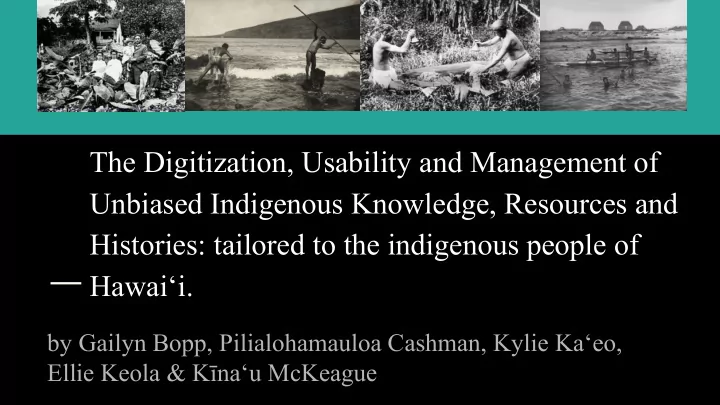

The Digitization, Usability and Management of Unbiased Indigenous Knowledge, Resources and Histories: tailored to the indigenous people of Hawaiʻi. by Gailyn Bopp, Pilialohamauloa Cashman, Kylie Kaʻeo, Ellie Keola & Kīnaʻu McKeague
What is your source and foundation? How would you choose to showcase it?
Indigenous Knowledge … the knowledge that an indigenous (local) community accumulates over generations of living in a particular environment. This definition encompasses all forms of knowledge – technologies, know-how skills, practices and beliefs – that enable the community to achieve stable livelihoods in their environment. ~ United Nations Environmental Program
What’s in a Name ● Traditional Knowledge (TK), ● Indigenous Technical Knowledge(ITK) ● Local Knowledge (LK) ● Indigenous Knowledge System(IKS)
Non-LIS thinking on Indigenous Knowledge Business & Management Perspective ● Indigenous Knowledge as type of Intellectual Capital ● Indigenous Knowledge can create monetary value ● STAKEHOLDER vs Shareholder Theory The Role of Ethics in the Commercialization of Indigenous Knowledge (Orozco & Poonamallee 2013)
vs. Shareholder Stakeholder Social Relationships not Contracts = Profits (Orozco & Poonamallee 2013)
“Managing Indigenous Knowledge requires balancing stakeholders’ interests to achieve and maintain cooperative relationships.” (Orozco & Poonamallee 2013)
Our solution, our responsibility... ● Usability ● Digitization ● Management
Usability Difficulties... ● Language ○ “Shareability” and “Reusability” ○ Centralizing information ● Categorizing ○ Controlled vocabulary ● Access ○ Not all knowledge should be open access Papakilodatabase.com
Usability What has been done… ● Papakilo Database ○ Centralizing information in one place ● Ulukau.org
Usability Possible Solutions ● Collaboration ○ Indigenous Council ○ Open Source Software ● Keeping the Native User in Mind
Digitization “ Being aware of the context of names and the colonial practice of renaming helps us understand the frustration indigenous people ʻ s experience when attempting to research indigenous histories through western-oriented classification and cataloging systems. It also helps us to appreciate the depth of the hegemonic rules of order that, through the disciplining of knowledge and power, makes it challenging for groups of concerned individuals requesting revisions in cataloging and classification systems to see those changes through.” (Duarte & Belarde-Lewis 2015)
Digitization ● Ethical Issues Access, Display, Cultural Rights & Ownership, Custodial Practices, and Consultation ● Converting Indigenous Knowledge "The character of Indigenous traditional knowledge does not lend itself to print, electronic, or audiovisual means of recording" (IFLA) ● Contextualization of Information Reduce risk of misuse, failure to respect importance Maintain integrity of the collection ( Whaanga, Bainbridge, Anderson, Scrivener, Cader, Roa & Keegan 2015)
Digitization ● Conceptualizing A Model For Digitization Claiming, Remembering, Revitalizing, Connecting, Representing,Returning Protecting, Sharing ● Digital User Interfaces Encapsulate key underlying principles of the collections, Maintain advantages of digital form over physical form ● Key Software Elements Hawaiian language macronizer, Spatial hypermedia browser and editor, Digital Library toolkit ( Whaanga, Bainbridge, Anderson, Scrivener, Cader, Roa & Keegan 2015)
Management The AQUISITION ● Gift & Acceptance ● Custody ● Access ● Care ● Insurance
Indigenous Collections ● Mātauranga Maori - The Pei Jones Collection ● Village Voice and Tribal Disphora ● Culturally Sensitive Collections Care Program ● Ara Irititja Project ● The Archive of the Indigenous Languages of Latin America
Wao Kānaka: The Hawaiian Pre-Contact Ecological Footprint *ʻAno lani – a heavenly nature / ʻAno honua – an earthly nature *Realm of nature and kuleana of the gods and chiefs. *Heavenly place inhabited only by the gods, no man is found here. *Lani – chiefs of Hawaiʻi, descendants of the gods. *Inland region where the people live and work. *Where daily life of the people takes place; e.g. farming, food preparation, weaving, and constructing shelters. *Where tasks of the nation are carried out. *All that we are comes from the depths of the ocean. *Kahiki is where gods and man come from. Native Hawaiian Education Program (NHEP) http://hawaiialive.org/index.php
Indigenous Community of Hawai ʻ i ● Hula Preservation Society ● ʻUluʻulu ● Bishop Museum ● Hawaiian Mission Houses Museum ● Hawaii State Archives ● Lyman Museum ● Hamilton Library - UH system Libraries
E ākoakoa mai mākou, e kuʻi ka lono a hoʻolohe. ʻAʻole i pau ka ʻike i hālau hoʻokahi. ~ Poi Dogs
First Hand Experience of problematic issues involving subjects and Metadata Activity
In your groups take the various titles and or descriptions of these items and write a list of relevant descriptive words and/or possible subject headings ● Topic: Hula and Mele ● A Legendary Tradition of Kamapua’ a ● A Kamehameha Biography ● The Kumulipo Photos courtesy of amazon.com
Discussion Questions What would having Indigenous Knowledge available/digitally accessible in libraries empower your community members to do/become? What are some roadblocks that you can see with gathering Indigenous Knowledge from our kupuna, and what could be done to overcome that? What are some ways library directors can form relationships with the indigenous community, especially if they are not from here/of Hawaiian descent?
Works Cited Duarte, Marisa Elena, and Miranda Belarde-Lewis. “Imagining: Creating Spaces for Indigeneous Ontologies.” Cataloging & Classification Quarterly 53.5-6: 677-702. Print. Dutfield, G. “The public and private domains: Intellectual property rights in traditional knowledge.” S cience Communication 21.3 (2000): 274–295. Web. Ekwelem, V.O, V.N Okafor, and S.C Ukwoma. "Preservation of Cultural Heritage: the Strategic Role of the Library and Information Science Professionals in South East Nigeria." Library Philosophy and Practice . 2011. Print. Native Hawaiian Education Program (NHEP). “Hawai ʻ i ALIVE.” Bishop Museum , 2005-2011 . Web. 26 Sep. 2015. <http://hawaiialive.org/index.php> Orozco, David, and Latha Poonamallee. "The Role Of Ethics In The Commercialization Of Indigenous Knowledge." Journal Of Business Ethics 119.2 (2014): 275-286. Business Source Complete . Web. Whaanga, Hēmi, David Bainbridge , Michela Anderson , Korii Scrivener , Papitha Cader, Tom Roa , and Te Taka Keegan. “He Matapihi Mā Mua, Mō Muri: The Ethics, Processes, and Procedures Associated with the Digitization of Indigenous Knowledge—The Pei Jones Collection.” Cataloging & Classification Quarterly 53.5-6 (2015): 520-547. Print. Wilson, Shawn. Research Is Ceremony: Indigenous Research Methods . Black Point, N.S: Fernwood Pub, 2008.
Recommend
More recommend